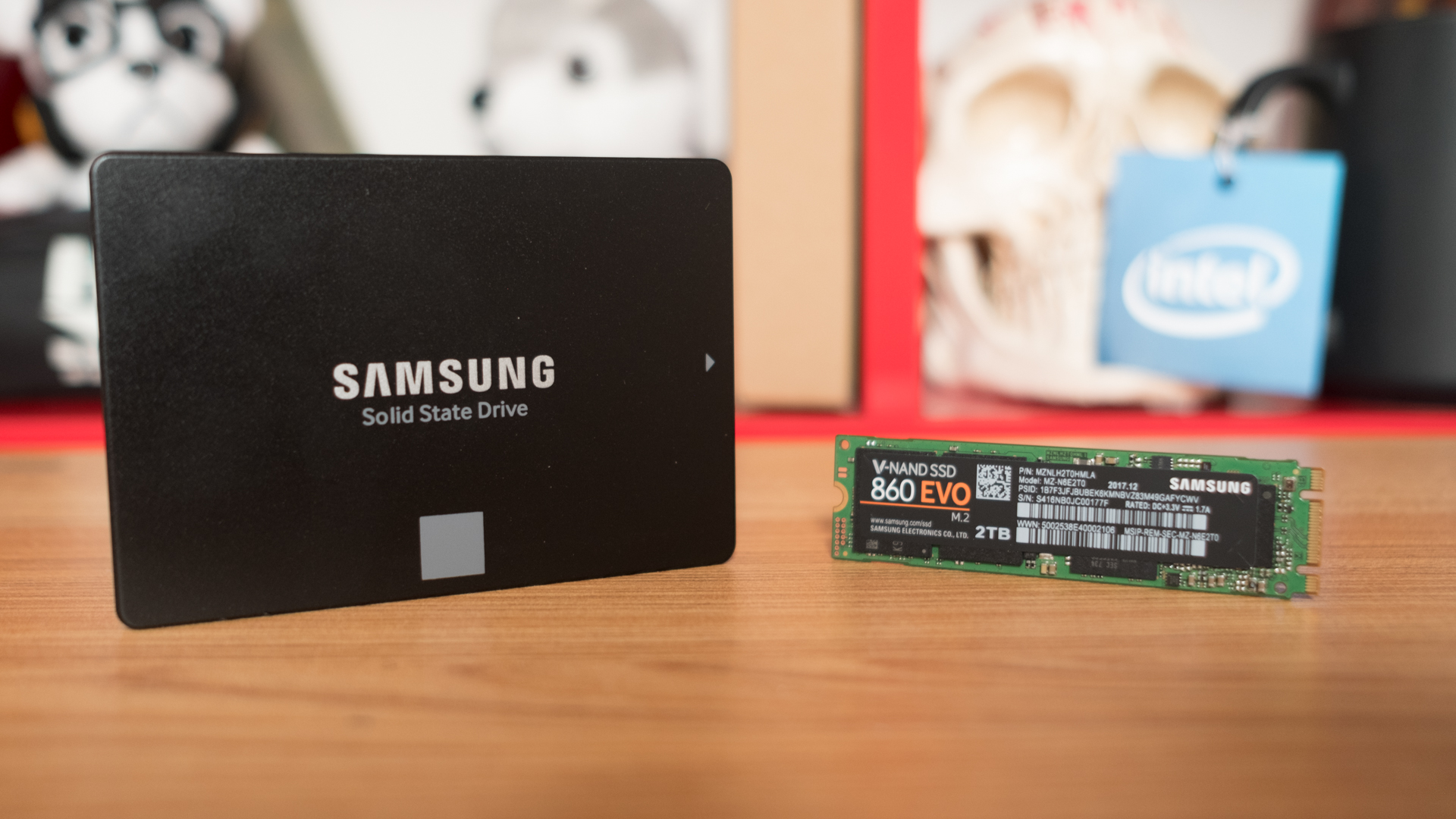TechRadar Verdict
The Samsung 860 Evo is a perfect follow up act that improves on its predecessor in every way with faster speeds and greater endurance – all while retaining its low prices to boot.
Pros
- +
Small, but noticeable speed increases
- +
Quadrupled endurance
Cons
- -
SATA 3 protocol limits maximum potential
Why you can trust TechRadar
The Samsung 850 Evo is a hard act to follow – it’s still one of the best SSDs we’ve ever used, so the Samsung 860 Evo has its work cut out for it. Ever since it released in December 2014, the 850 Evo has enjoyed its prominence, thanks to fast speeds, tested endurance and great value.
Luckily, the Samsung 860 Evo follows in its footsteps successfully, with faster speeds and even better endurance. After thoroughly testing both the 2.5-inch and M.2 SATA versions of the 2TB Samsung 860 Evo, we can confidently say that it’s one of the best SSDs on the market right now.

Features and price
As with Samsung’s recently revamped 860 Pro SSDs, the 860 Evo series is powered by 64-layer V-NAND technology. (V-NAND stands for vertical NAND, which contains flash cells stacked vertically and 3 dimensionally for greater density and speed) Additionally, the drives utilize a MJX SATA controller paired with 2GB of LPDDR4 DRAM – specific to 2TB models only – for enhanced speed and power efficiency.
These specs, when considered together, allow the M.2 SATA version of the Samsung 860 Evo series to achieve sequential read speeds up to 560 megabytes per second (MB/s) and sequential writes up to 520 MB/s. The 2.5-inch drives from the same line only falter slightly with a 550 MB/s sequential read, but you’ll only find 4TB Samsung 860 Evo SSDs in this form factor.
Samsung has also improved its endurance with the 860 Evo. This is typically measured through a unit known as Total Bytes Written, which is mostly meant to give users a sense of how long their drive should last. Whereas Samsung pinned its last generation 850 Evo with a TBW of 300TB, the 860 Evo is rated at a whopping 1,200 TBW – in other words, four times the endurance.
Just like its predecessors,the Samsung 860 Evo series is meant to be both affordable and deliver a huge amount of solid state storage. Prices for both the M.2 SATA and 2.5-inch versions start at $94 (£98, AU$139) for 250GB, ramping up to $169 (£169, AU$245) for 500GB, $329 (£329, AU$476) for 1TB, $649 (£629, AU$1,049) for 2TB and $1,399 (£1,399, AU$2,249) for 4TB.

Samsung 860 Evo (2TB SATA)
CrystalDisk Mark (Sequential) Read: 562.7 MB/s; Write: 533.3 MB/s
CrystalDisk Mark (Random) Read: 339.4 MB/s; Write: 332.9 MB/s
10GB File Transfer: 14.58 seconds
10GB Folder Transfer: 26.91 seconds
Samsung 860 Evo (2TB M.2 SATA)
CrystalDisk Mark (Sequential) Read: 557.1 MB/s; Write: 515.9 MB/s
CrystalDisk Mark (Random) Read: 243.7 MB/s; Write: 236.3 MB/s
10GB File Transfer: 13.71 seconds
10GB Folder Transfer: 25.63 seconds
Performance
One of the first things that stuck out in our testing was the fact that the M.2 SATA version of the Samsung 860 Evo didn’t hit its maximum rated speeds in CrystalDisk Mark. this is probably because of driver issues, but we hope this is fixed in the near future.
Sign up for breaking news, reviews, opinion, top tech deals, and more.
Beyond that, ultimately nothing seems to be hampering the performance of the M.2 SATA drive, as it ran away with the fastest single file and file folder transfer by almost a full second in each regard.
In fact, our testing showed small but noticeable improvements in the Samsung 860 Evo’s performance over its predecessor. Namely, there are 5-20 MB/s improvements in both sequential read and write speeds. The 2.5-inch version of the Samsung 860 Evo also achieved significantly higher random random read and write speeds that are 60-70 MB/s faster.
When stacked against an Intel SSD 540s Series SSD (2.5-inch), Samsung comes out on top with significantly faster speeds overall, not to mention it costs less. Whereas this 480GB Intel drive is priced at $199 (£199, AU$269), the 500GB Samsung 860 Evo runs for $169 (£169, AU$245).
The Samsung 860 Pro is still the king of the SATA drives with a faster sequential read and write speed, on top of 10-20 MB/s faster random read and write speeds. These will ultimately lead to faster load times, booting sequences and general file transfers, though the difference will be virtually impossible to distinguish.

Final verdict
The Samsung 860 Evo is an undeniably better series of solid-state drives than their predecessors. They achieve noticeably faster speeds and offer quadruple the endurance. While we struggled to see the 860 Pro as a noteworthy upgrade, Samsung has brought its budget SSD line to flagship spec – or at least the highest spec the aging SATA 3 standard will allow.
- Find the best deals on Samsung products with our Samsung promo codes.

Kevin Lee was a former computing reporter at TechRadar. Kevin is now the SEO Updates Editor at IGN based in New York. He handles all of the best of tech buying guides while also dipping his hand in the entertainment and games evergreen content. Kevin has over eight years of experience in the tech and games publications with previous bylines at Polygon, PC World, and more. Outside of work, Kevin is major movie buff of cult and bad films. He also regularly plays flight & space sim and racing games. IRL he's a fan of archery, axe throwing, and board games.
